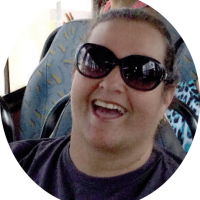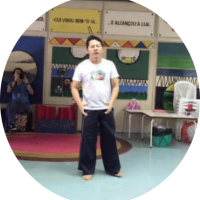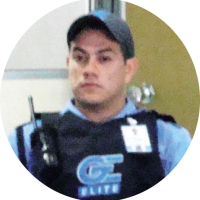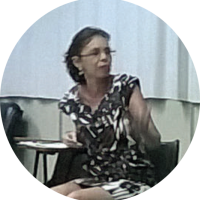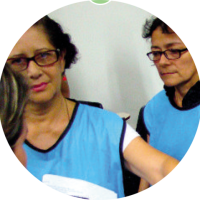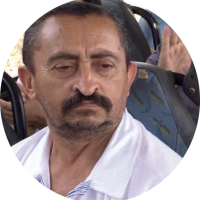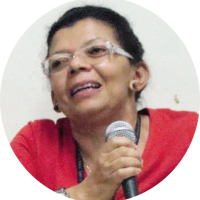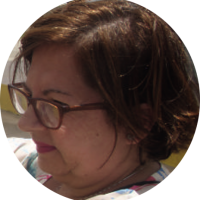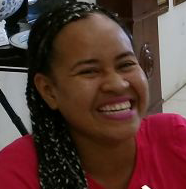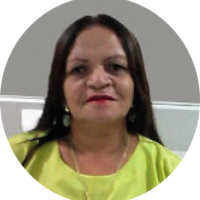I always say that I fell from parachutes in Tô na Rede, because I already took the tram on foot … But it was a fantastic experience, very enriching; I acquired various knowledge, and also, among them, many myths were destroyed. Many difficulties I had to relate to myself and to the other, the project really made me break, put out what was stored, stored inside me. With all this, Tô na Rede enriched not only me, but all the people who were part of it, and our city as well. We acquire not only knowledge, but also the grace to look to the future with hope, and to know that we can be instruments of change, transformation for our society, through our culture, education, leisure … And with all partners who, with us, make this happen in our daily life, in each place, especially in Arapiraquinhas.
Testimonials
- Home
- Testimonials
José Monteiro – Belém (PA)
I work with a specific area for the visually impaired, the Braille section of the Arthur Vianna Library. I’m in the Tô na Rede project from the beginning. But for me, at first the project did not have much credibility, because there have already been some projects here in the library and all halted. And Tô na Rede really came to make a difference, especially in the human issue. There was a union, there was a differentiated work in this relationship, not only inside the library but outside, with our partners, our partners. And this is a very important thing for any institution that works with the social issue. What struck me a lot was this: you can get to know your friend better, your colleagues at work, and also give your library partner a greater opportunity to interact. So, there is already a difference in the treatment …
Cássio Rodrigo – Belém (PA)
There was a lot of change after Tô na Rede came here to the library. The servers are friendlier. Before, it seems that there was a separation, there was a wall between us; not now. And not just with security personnel, but with general service personnel as well. Because Tô na Rede is doing this program, it is much better the coexistence here. Even the uniform has changed, now it’s more presentable. Before, the uniform was very old, it was embarrassing for the associates they attended. And then they had no respect for us – they were afraid! We were going to talk to them and get very stiff because of that uniform. It’s much better now. They are behaving better, and they are truly respecting.
Maiolina Nascimento Neves – Belém (PA)
Before Tô na Rede, I always believed in something innovative. And I’ve always believed that working with the community is very strong, not only for me, but for all the people who came here daily in the library. So I’ve always been very close to this community. I think Tô na Rede comes to reaffirm this that I believe – that the strength of the library is in the community. It is not in an institution itself, but rather in the community, which comes every day here, in our work, in our library, to search for what moves each one: it is either a consultation, or a manga, a comic book … And we’re here. I am here every day, as if it were the first day of my work. Always open and always cheerful. Maybe it’s also because of what I do in the library, which is the ludic part. But it also has to do with my way of being. So the project comes to reaffirm what I feel and what I believe, what is this exchange of knowledge with the other – not only the technological knowledge, but from person to person.
Filomena Eliza B. Jesus de Castro – Belém (PA)
I work in the works section and I am participating in the Tô na Rede project. We learned that we should not work between four walls, but rather leave the library and go to the communities. I had more difficulty in the area of computer science, because, as I am not very adept at technology … The computer modules, for me that I am an apprentice, were few, I needed more. I had never had contact with computers before Tô na Rede. So, I hope that more modules will come with other subjects so that we can continue with this project.
Adelmo Rodrigues de Mello – Arapiraca (AL)
The Tô na Rede project offered me the pleasant opportunity to increase my incentive, my will and my willingness to verify that Brazil’s problems – if not all, a large part – can be solved with culture, with instruction and reading. So, 100 years ago Monteiro Lobato already stated that “a country is made with men and books”. If at that time books and reading were already so important for the transformation of society, imagine today! We need to encourage reading, education and culture to transform that society, which we can say, to a certain extent, degraded … Especially young people need this education, this incentive, this reading and culture to be transformed; Brazil needs this a lot. So, the project Tô na Rede brought this incentive, and I left with much more desire to work on this issue, which is something that will help transform this society.
Rita de Cássia Ferreira Guimarães – Belém (PA)
Tô na Rede was a project that came to energize, to revolutionize, to shake off the concepts that I learned in relation to the community and to encourage the coexistence with our public. Soon after we started, we left the library and went to meet other places and communities … The project gave me a whole background, a greater professional knowledge. It was all good, meeting the teachers, the instructors, getting to know our colleagues better, in the experiences that were made here … I just have to thank this project, plus this knowledge in my professional and personal life.
Wilma Maria Nóbrega Lima – Arapiraca (AL)
Tô na Rede came to touch us, with our behaviors before our “cultural agents”, “readers, readers”, whatever the denomination. How do we behave as librarians, public libraries, pedagogical coordinators, in front of our public and society? A new look at our performance as professionals of In (training). Where was the community? Have we watched your demands? Have your charms and knowledge been invited into our libraries? We are eleven units with their teams participating in the formations; therefore, we have to focus on the main objective of all this effort. Whether Arapiraquinha, Central Library, or the Knowledge Industry, we already understand that our libraries need to be OPEN and we, even more OPEN, to the new, to the demands of all genres and ages. We are a network model of public libraries. But, are we really a NETWORK? For a more reading Arapiraca, for a municipal public policy of books, reading, literature and libraries, there is a lot missing! We lack our union, share knowledge and experiences, recognize that our façades are beautiful, but our interior needs to be reviewed, with qualified personnel, with guaranteed maintenance, with a collection policy, with equipment actually working … but in the medium term, and if it depends on our strength and commitment, as we have seen in the formations, in a much shorter period we can change this reality. Guys, this course is participative. Everyone has the right to speak, express their opinion, develop their talents, share and recognize reality and working conditions. Only then can we detect problems and seek alternatives to solutions that are – or not – within our reach. That’s it!
Dayane Cristina de Souza Brito – Belém (PA)
In all the modules of Tô na Rede, we learned a lot. And we ended up realizing certain things that we did not see before. In the first moment we did a survey of the problems that we have here, of the difficulties that we face in each section of the Foundation. And we ended up seeing that there are some solutions that are simple and that would be within our reach to solve certain problems. For example, in the modules of Technology – ICT 1 and ICT2 – we had information about some programs and also learned how to use social networks. And before we were even afraid to move – we hear a lot of talk but do not know how to use! So we had these notions about using social networks – Facebook, Instagran and other networks as well. We talk about the responsibility we have before posting, to check very carefully the information that will be disclosed – this is very important! And soon we started to use these networks, to post things, it was very cool for everyone! We had the Mapping module, which was fantastic. We left the Library building and went to visit some institutions and entities. So we were able to understand and feel the problems people face in the community, to know how they see the library … This is fundamental to our work, to know how to reach out to the community, how to involve these people truly in the activities, so that the library can carry out its true mission, which is, in fact, to serve the communities. For us, this contact was very important, and it was extremely exciting to identify, to feel the problem of each one of each entity … To see that, despite the difficulties that each community has, the staff does not give up, and continues doing the work with much love and affection, serving the population. This was a lesson for us. We had another interesting module, which was Discovering Talents. Then we discover the bread Tô na Rede, which is made by Lindalva; we discovered that Darci – one of the cataloging librarians – knows how to make carpets, embroidery, curtains … And we also discover some people who sing, others who play. This shows the talents that we have and that often we only show for our family. It is nice to be able to show our talents, which are sometimes hidden, so that we can add to the activities that are carried out in our profession and in our work environment. Another module that was outstanding dealt with the issue of Ethics and Citizenship. I do not forget the phrase that was constantly said in this module: “Be careful what you crave, because you may end up achieving …”. We have seen what is ethical and what is citizenship – what are our rights, what are our duties. What is it to be a citizen, and how can this citizen transform the reality in which he lives? What is it for us to do, or what do we have to expect someone to do for us? What’s out there, and what do we have to do with what’s out there? We have everything to see, because we are here in function of society and community. We exist, this building exists, this Library exists so that we can attend to the community in fact. So, this was very nice for us, for the content and for everything that ends up reflecting in our lives, this self-reflection of our role as citizens.
This is critical. In short, Tô na Rede gives us an insight into our responsibilities and how important it is to have a broad vision of our true role in society, and to have this instrument that is the library, with which we can bring information and knowledge to the population. And with that we can, in fact, help improve a lot.
Rosinalva Farias dos Santos – Arapiraca (AL)
When I started doing this project, I felt like a little bird flying, not knowing where to land … But, from there, I saw that it was not the way I was thinking. I started to understand after the mapping, which was a very important job, because then I was able to understand what Tô na Rede is. We went out interviewing each person, and then I saw the importance of this research, to discover wonderful people … I saw the look of each one, the joy they had in receiving us and talking about their work, this is very significant. After all, I felt like a person with more knowledge, knowing how to work and being able to take everything I learned to my students. Tô na Rede was the best course I did, and knowing that our professionals cared about our work made all of us look different. For me, it was really the best course I did – I learned wonderful things, thanks to all of you.


